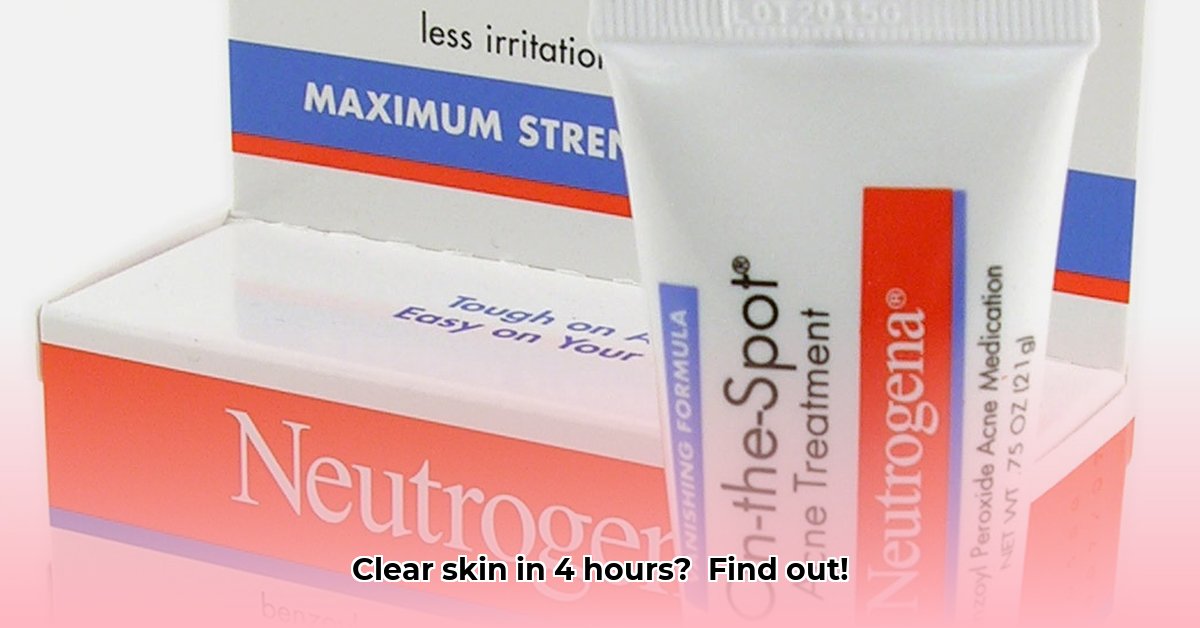
Neutrogena Acne AM Treatment: A South African Perspective
So, you're battling aknee (acne) and eyeing Neutrogena's Acne AM Treatment? Their claim of clearer skin in four hours sounds almost too good to be true, nê (isn't it)? This review will delve into the product, separating fact from marketing fluff. We'll examine the ingredients, its mechanism of action, and whether it's worth adding to your skincare routine – and importantly, we'll discuss its suitability for South African skin tones and conditions.
Breaking Down the Claims
The key ingredient in Neutrogena's Acne AM Treatment is benzoyl peroxide. This is a well-established acne treatment; it's been around long enough to have a solid reputation. Neutrogena uses a micronised (finely ground) form, meaning the particles are smaller, potentially allowing for better absorption and quicker action into the skin. This could theoretically lead to faster results, but further research is needed to support this claim specifically.
The company's "clear skin in four hours" claim is, however, ambitious. While many users report improvement with benzoyl peroxide treatments, there’s a lack of robust independent clinical trials to substantiate such a rapid effect. It's important to approach such claims with a healthy dose of scepticism.
What the Experts Say
Dr. Nomusa Dlamini, Dermatologist at the Johannesburg Dermatology Clinic, explains: "Benzoyl peroxide is a proven acne fighter, effective in killing Propionibacterium acnes, the bacteria implicated in acne. However, individual responses vary widely. Results depend on factors like acne severity and skin type."
Side Effects: What to Watch For
Even though the Neutrogena Acne AM Treatment is formulated without common irritants like oils, parabens, and fragrances, dryness, redness, and peeling are still possible side effects. This is why a patch test is paramount. Always apply a small amount to a hidden area of skin (like your inner arm) 24 hours before applying it to your face.
Using Neutrogena Acne AM Treatment Safely and Effectively
Here's how to incorporate it into your routine safely:
- Patch Test: Before applying it to your face, test a tiny amount on a small, inconspicuous area of skin and wait 24 hours to check for any reactions.
- Start Slow: Begin with infrequent application, perhaps once or twice a week, gradually increasing frequency as tolerated.
- Sun Protection: Benzoyl peroxide increases sun sensitivity. Always use a broad-spectrum sunscreen with a high SPF (at least 30), even on cloudy days.
- Hydration: Keep your skin well-hydrated with a gentle moisturiser to counteract potential dryness.
- Consult a Dermatologist: For persistent or severe acne, a dermatologist can provide a tailored treatment plan based on your specific needs.
Pros and Cons: A Balanced View
| Pros | Cons |
|---|---|
| Contains benzoyl peroxide, a proven acne fighter | Potential for dryness, redness, or irritation |
| Micronized formula for potentially faster action | Lack of independent studies verifying "4-hour" claim |
| Available widely in South Africa | Individual results vary; may not be suitable for all skin types |
The Verdict: Realistic Expectations
Neutrogena's Acne AM Treatment could be a useful addition to your skincare routine, but it's not a miracle cure. The "four-hour" claim requires more rigorous validation. Remember, consistent use and patience are essential. A patch test is non-negotiable, and consulting a dermatologist is always a good idea, especially if you have sensitive skin or severe acne. Jou vel is belangrik; treat it with care! (Your skin is important; treat it with care!)
Best Benzoyl Peroxide for Sensitive Skin? A Deeper Dive
Key Takeaways:
- Benzoyl peroxide's effectiveness is well-established, but sensitivity is a concern.
- Lower concentrations are generally better tolerated by sensitive skin.
- Patch testing is crucial, especially for those with sensitive complexions.
- Individual results vary considerably – what works for one person may not work for another.
Using Neutrogena’s Acne AM Treatment safely and effectively requires careful attention to your skin's specific needs. Remember to always consult a dermatologist if you experience sensitivity or have concerns about your skin condition. Don't hesitate to seek professional advice; it's a worthwhile investment in your skin's health.